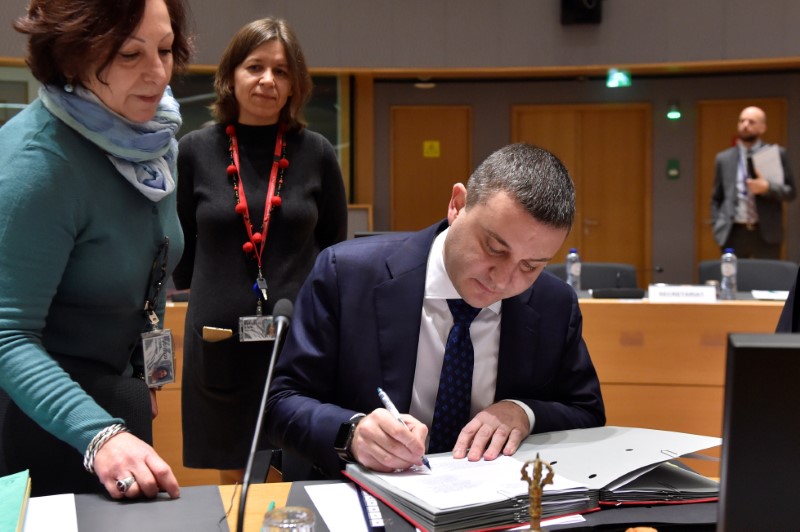 © Reuters. Bulgaria’s minister of finance Vladislav Goranov signs documents as he attends a European Union finance ministers meeting in Brussels
© Reuters. Bulgaria’s minister of finance Vladislav Goranov signs documents as he attends a European Union finance ministers meeting in BrusselsSOFIA (Reuters) – Current EU chair Bulgaria backs increased payments by member states to the next long-term European Union budget to maintain financing for infrastructure projects and farmers from 2021, its finance minister said on Friday.
With the impending departure of Britain, a net budget contributor, from the EU, the other 27 member states are preparing for a particularly tough battle over the scale and priorities of the next multi-year spending plan.
Poorer ex-communist countries, including Bulgaria, are net beneficiaries of the budget and fear they will lose out if the EU fails to plug an expected annual revenue gap of nearly 10 percent caused by Brexit.
Germany and France, the biggest EU economies, have signaled a readiness to increase their contributions, with certain conditions, but a group of other wealthier member states led by the Dutch are opposed to having to chip in more.
Finance Minister Vladislav Goranov of Bulgaria, which holds the EU’s rotating six-month presidency, said his country was also prepared to increase its own contribution to the budget by 10 percent, as was currently being discussed.
“We support the opinion of some countries that in order to maintain the Cohesion Policy and the Common Agriculture Policy an increase of contributions may be necessary. In that sense, we are ready to support such a decision,” Goranov told reporters during a conference in Sofia on the next EU budget.
The EU’s cohesion policy aims to channel funds to poorer countries and regions through infrastructure and other projects.
EU Budget Commissioner Guenther Oettinger, who will also attend the conference in Sofia, has suggested the next EU budget should be equal to 1.1 or 1.2 percent of the bloc’s total gross domestic product, up from 1.0 percent at present.
Fusion Media or anyone involved with Fusion Media will not accept any liability for loss or damage as a result of reliance on the information including data, quotes, charts and buy/sell signals contained within this website. Please be fully informed regarding the risks and costs associated with trading the financial markets, it is one of the riskiest investment forms possible.
Source: Investing.com






























